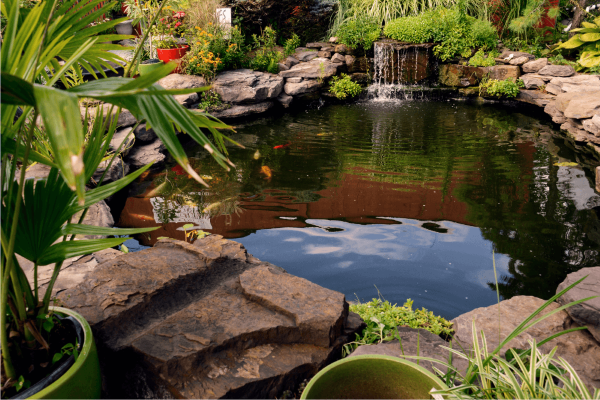Maintaining a garden pond involves several key steps to ensure it remains healthy and attractive. Here are some essential tips:
- Regular Cleaning: Remove debris, fallen leaves, and any dead plant material to prevent water contamination.
- Manage Nearby Plants: Trim back overhanging branches and plants to reduce the amount of organic matter falling into the pond.
- Grow Water Plants: Introduce oxygenating plants to help maintain water quality and control algae growth.
- Control Ice in Winter: Use a pond heater or floating de-icer to prevent the pond from freezing completely. This will ensure fish and plants survive during long periods of icy temperatures.
- Algae Control: Shade the pond with floating plants and avoid overfeeding fish to reduce nutrient levels that promote algae growth.
- Maintain Equipment: Regularly check and clean the pump, filter, and any fountains to ensure they are functioning properly.
- Water Level: Keep the water level consistent. Topping up with rainwater if possible to avoid adding excess nutrients from tap water.
- Monitor Water Quality: Test the water regularly for pH, ammonia, and nitrate levels. This will help to ensure a healthy environment for fish and plants.
Maintaining water quality in your garden pond
This is important for the health of your fish and plants. Here are some key tips to help you keep your pond water clean and balanced:
- Regular Cleaning: Remove debris such as leaves, twigs, and dead plants from the pond regularly to prevent decay and water contamination.
- Proper Filtration: Install a good quality filter system to remove impurities and maintain clear water. Regularly check and clean the filter to ensure it functions effectively.
- Aeration: Use a pump or fountain to keep the water well-aerated. This helps maintain oxygen levels, which is essential for fish and beneficial bacteria.
- Monitor Water Parameters: Regularly test the water for pH, ammonia, nitrite, and nitrate levels. Aim for a neutral pH around 7, and keep ammonia and nitrite levels as close to zero as possible.
- Control Algae Growth: Introduce barley straw or use pond-safe algaecides to control algae growth. Adding oxygenating plants like hornwort and elodea can also help keep algae in check.
- Avoid Overfeeding Fish: Overfeeding can lead to excess waste, which can degrade water quality. Feed your fish only the amount they can consume in a few minutes.
- Water Changes: Perform partial water changes regularly to dilute accumulated toxins. Every few weeks, replace approximately 10-20% of the pond water, and use a water conditioner to neutralize chlorine if tap water is used.
- Maintain Plant Balance: Ensure a good balance of submerged, floating, and marginal plants. Plants aid in absorbing surplus nutrients and offer shade, which helps in reducing the growth of algae.

Keep mosquitoes away!
Preventing mosquitoes in your garden pond is crucial to maintaining a pleasant and healthy environment. Mosquitoes lay eggs in still water, so installing a fountain, waterfall, or aerator. This can help keep the water circulating and deter mosquitoes. Attracting natural predators such as dragonflies, damselflies, frogs and birds will also help keep the mosquito numbers down. Fish such as guppies and goldish eat mosquito larvae so will also help prevent mosquitoes from ruining your summer evenings.
By following these steps, you can enjoy a beautiful and thriving garden pond throughout the year.





